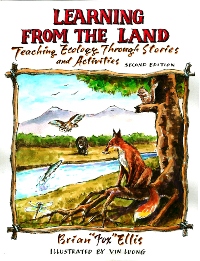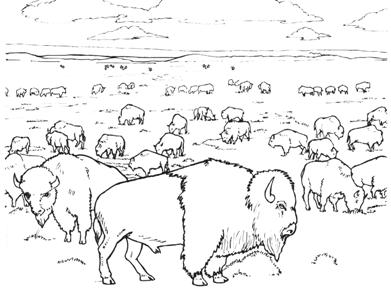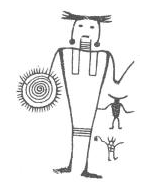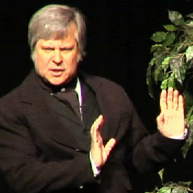Fox is trained as a high school biology teacher, has worked as a consultant with dozens of major science museums and regularly keynotes environmental education and science teacher conferences. Every workshop includes a mix of creative non-fiction, poetry, and audience participation. Programs are participatory because the only way to learn storytelling is by doing it. Fox also exemplifies the idea that science is be a verb, something you do, so his programs model real inquiry engaging participants in the scientific process. For workshops he prefers access to the outdoors. You will note some overlap in the following programs, but you will also note that each has a slightly different emphasis, everything is custom tailored, based on the needs of the host and the participants. Content can be adapted to include your core curriculum, the local flora and fauna, and the local geological and natural history of your region.
Follow this link to view the Books, Learning From the Land, & Frog Songs
Follow this link to view related CDs
Here are a few of his favorite workshops:
Breathing Life Into Dry Bones: Storytelling and Creative Writing as Tools for Teaching Science Process Skills - Storytelling can breathe life into dry bones, it allows you to travel through geological time and enter the worlds of molecules and woolly mammoths. From plate tectonics and mineral cycles to metamorphosis and reproductive cycles, stories can make abstract concepts concrete and palpable. Creative writing allows students to explore these ideas and reflect the depth with which they understand them. In this workshop you will be dazzled with stories, write and tell a few of your own and learn to inspire your students to create tales that demonstrate their knowledge of scientific facts, concepts and the inquiry approach to the scientific method.
Stepping Into Character: Presenting First Person Interpretations - The stories of historic scientists allow you to travel to distant times and places and peer over their shoulder as they make the discoveries that changed our world. Meet Darwin, Audubon and Mendel on the eve of their greatest discoveries. Choose an important character from the past, step into their shoes and learn to embody the inquiry approach to science while raising questions to stimulate further research! The goal of this workshop is to help you bring to life the characters you connect with and tell their stories in a powerful performance. (Stop lecturing and tell more stories!) We will discuss research, choosing characters that fit, developing scripts, creating costumes, and how to teach your students these skills so they can develop their own unique hands-on lessons for their peers.
The American Naturalist Tradition: The Storyteller’s Journey Through Science and Literature - Walking a path first blazed by Ralph Waldo Emerson, Henry David Thoreau, Aldo Leopold and Rachel Carson; Brian “Fox” Ellis travels in the tradition of the American Naturalists. This interdisciplinary workshop will integrate classic literature, creative writing and science process skills. A poet’s eye and gift for language is very similar to the detailed observation and ability to communicate complex ideas required of scientists. Storytelling can breathe life into dry bones, it allows you to travel through geological time and enter the worlds of molecules and woolly mammoths. Poetry can help students write clearer more exciting essays. Come to celebrate the voices of nature and find your voice as a poet within the great tradition of American Naturalists. (This presentation was originally a keynote address at the Illinois Teachers of English Conference.)
 Prairie Tales: Explore the Natural History of this Diverse Ecosystem Through Stories and Songs, and Hands-on Activities - Plains Indian folklore and pioneer history blend in this celebration of one of America's most diverse and magnificent ecosystems. Through seed collecting, sorting, and prairie plant propagation, learn the adventures of a seed and journey through the four seasons with the plants and animals that call the prairie home. Trace the geological history of the oak savanna through the travels of "Rusty", a molecule of ferrous oxide. By studying plat maps and soil maps, we will study the history of the landscape and unlock keys to recovery. Learn of the struggles and successes to restore the prairie to America's heartland. The workshop will focus on the human history and development of this region as it relates to the biodiversity and ecology of the prairie. Prairie fires and pioneer politics will blend in this epic performance of song and story, poetry and myth. (I have presented this program at the North American Prairie Conference where I was also a keynote speaker.)
Prairie Tales: Explore the Natural History of this Diverse Ecosystem Through Stories and Songs, and Hands-on Activities - Plains Indian folklore and pioneer history blend in this celebration of one of America's most diverse and magnificent ecosystems. Through seed collecting, sorting, and prairie plant propagation, learn the adventures of a seed and journey through the four seasons with the plants and animals that call the prairie home. Trace the geological history of the oak savanna through the travels of "Rusty", a molecule of ferrous oxide. By studying plat maps and soil maps, we will study the history of the landscape and unlock keys to recovery. Learn of the struggles and successes to restore the prairie to America's heartland. The workshop will focus on the human history and development of this region as it relates to the biodiversity and ecology of the prairie. Prairie fires and pioneer politics will blend in this epic performance of song and story, poetry and myth. (I have presented this program at the North American Prairie Conference where I was also a keynote speaker.)
Frog Songs: Poetry, Non-Fiction Writing, and Insect Science - A poet’s eye and gift for language is very similar to the detailed observation and ability to communicate complex ideas required of scientists. Learn to use haiku to teach entomology. Learn to use poetry to help students write clearer more exciting essays. Come to celebrate the voices of nature and find your voice as a poet.
Learning Stories from the Land: Teaching Ecological Ethics and Land Stewardship through Storytelling And Creative Writing - Learn to listen carefully to the creatures who share your home in this experiential exploration of the ideas found in deep ecology. By honoring our relationship with the land we notice that the landscape is full of stories clamoring to be told. Our goal is to inspire others to honor their connection with all of creation!
 Folklore and Ecology in the Diversity of Native American Cultures: Science, Social Studies and Native American Storytelling - In 1491 there were more than two hundred distinct cultures here in North America with cities larger than London, temples larger than the pyramids of Egypt, and a calendar more accurate than the Greco-Roman. Within this diversity stories were a unifying force. In this workshop, you will hear stories from several of the major tribal groups. You will learn some basic storytelling skills including cultural differences in style and content. We will discuss ways in which stories can highlight the differences and similarities between cultures and their relationship with the environment. Cooperative lesson plans for integrating language arts, science, and social studies will be shared. We will play traditional games, learn a craft, and perform a few dances. This is an opportunity to gain a deeper understanding of American Indian folkways and the ways in which they have impacted modern American culture. A bibliography and handouts for students will be included.
Folklore and Ecology in the Diversity of Native American Cultures: Science, Social Studies and Native American Storytelling - In 1491 there were more than two hundred distinct cultures here in North America with cities larger than London, temples larger than the pyramids of Egypt, and a calendar more accurate than the Greco-Roman. Within this diversity stories were a unifying force. In this workshop, you will hear stories from several of the major tribal groups. You will learn some basic storytelling skills including cultural differences in style and content. We will discuss ways in which stories can highlight the differences and similarities between cultures and their relationship with the environment. Cooperative lesson plans for integrating language arts, science, and social studies will be shared. We will play traditional games, learn a craft, and perform a few dances. This is an opportunity to gain a deeper understanding of American Indian folkways and the ways in which they have impacted modern American culture. A bibliography and handouts for students will be included.
Bird is the Word: Journaling, Poetry, Non-Fiction Writing, and Ornithology - A poet’s eye and gift for language is very similar to the detailed observation and ability to communicate complex ideas required of field ecologists. In this participatory workshop you will learn some tips for effective journaling. You will learn to use haiku to focus your eye and ear. You will learn to use poetry to help you write clearer more exciting essays and turn your field notes into publishable articles. Come to celebrate the voices of nature and find your voice in the natural world.





